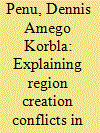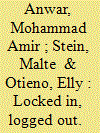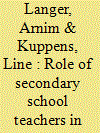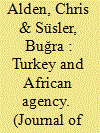|
|
|
Sort Order |
|
|
|
Items / Page
|
|
|
|
|
|
|
| Srl | Item |
| 1 |
ID:
191847


|
|
|
|
|
| Summary/Abstract |
For the first time in its history, Ghana held a referendum in 2018 to divide some of its regions to create new ones. Though the regions are purely administrative, the division faced resistance in some areas and not in others. This study combines qualitative comparative analysis with process tracing to show that the resistance occurred within regions with relatively high support for the opposition party, but only in the combined presence of (traditional) elites competing from either side of the region and controversies regarding claims to (traditional) political authority. Further, it finds a bottom-up mechanism of the resistance, evolving as the threatened interests of stakeholders grew from the community to the regional, national and diaspora levels. As in other African cases, this suggests that the sources of conflicts in Africa are not so much about ethnic differences but more about elites’ unequal access to political and economic resources.
|
|
|
|
|
|
|
|
|
|
|
|
|
|
|
|
| 2 |
ID:
191842


|
|
|
|
|
| Summary/Abstract |
This article examines the impact of the pandemic on ride-hailing drivers and their mitigation strategies during lockdown in Africa. Ride-hailing has emerged as one of the latest paid-work opportunities for the continent's many unemployed. Yet, ride-hailing companies such as Uber and Bolt misclassify drivers to avoid regulation and responsibilities towards workers’ welfare. Drawing on 34 in-depth interviews with ride-hailing drivers, driver representatives and trade unions in South Africa and Kenya, this article makes two arguments. First, the gig economy in Africa provides work opportunities for the unemployed on the continent and simultaneously vitiates the working conditions through the commodification and informalisation of work. Second, the state-directed emergency measures act as a veneer to capital's efforts to commodify labour and the gig economy platforms have emerged as primary tools for it. Our account points to an urgent need for better regulatory systems to hold platform companies accountable and a collective bargaining mechanism in the gig economy.
|
|
|
|
|
|
|
|
|
|
|
|
|
|
|
|
| 3 |
ID:
191843


|
|
|
|
|
| Summary/Abstract |
Much attention has been paid to the growth of Pentecostal-charismatic Christianity in Uganda and the way it has shifted over the past decades from being a minority religion to influencing and shaping the Ugandan public and political spheres. Most of the literature, however, associates the Pentecostal-charismatic dynamic public action with its motivation to promote conservative Christian values, especially around issues of sexuality, HIV/AIDS, reproduction and family values. This article extends this literature by providing a fuller explanation for the reasons behind its public transformation and its relation to power, in particular its loyalty to and support for President Museveni. Drawing on participant observation and interviews conducted over several years, this article argues that along with theological and moral explanations, it is important to understand how local and contextual dynamics interplay. Indeed, the uncertainties and memories of the difficult origins of the Pentecostal-charismatic movement and the lack of legal recognition as fully registered churches, still impact on the present and motivate them to be catalytic socio-political actors in need of forging strong connections with centres of power in Museveni's Uganda.
|
|
|
|
|
|
|
|
|
|
|
|
|
|
|
|
| 4 |
ID:
191844


|
|
|
|
|
| Summary/Abstract |
The article examines two decades of Jerry Rawlings’ rule in Ghana. It seeks to explain why Rawlings’ revolutionary populism did not develop in the direction that he envisaged: a new kind of popular democracy. Instead, Rawlings oversaw the reintroduction of Ghana's popularly preferred political system: ‘Western-style’ multi-party democracy, despite his avowed intention of not doing so. To what extent was this outcome surprising or puzzling? The article explains that it was neither surprising nor puzzling as Rawlings’ regime, the PNDC, lacked the capacity to introduce a radical new political system, despite his desire to do so. His aim – to craft a new kind of popular democracy – was not achievable as both internal and external opposition forces were stronger in their desire for multi-party democracy and a neo-liberal economic system.
|
|
|
|
|
|
|
|
|
|
|
|
|
|
|
|
| 5 |
ID:
191846


|
|
|
|
|
| Summary/Abstract |
Since Kenya's independence in 1963, ethnicity has been an important factor in Kenyan politics and everyday life. While recent research has shown that ethnic favouritism impacted the allocation of educational resources in the past, so far, no systematic research has been conducted on how teachers exacerbate, mitigate or countervail the political culture of ethnicity and ethnic favouritism. As agents of socialisation, teachers’ attitudes and behaviour can, consciously or unconsciously, convey the message that ethnic favouritism is normal and socially acceptable, or conversely delegitimise such practices. Based on a list experiment among 894 secondary school teachers in the county of Nairobi, we find that at least 25% of teachers have already favoured coethnic pupils. Interviews indicate that such favours are seldom blatant in nature and mainly serve to show solidarity with one's kin. Still, even small – frequently well-intentioned – favours may damage inter-group attitudes, trust and relations, and may even contribute to the persistence of ethnic politics.
|
|
|
|
|
|
|
|
|
|
|
|
|
|
|
|
| 6 |
ID:
191848


|
|
|
|
|
| Summary/Abstract |
The concept of ‘agency’ and its role in capturing the dynamics between Africa and external actors feature increasingly in the African IR scholarship. Over the past decade, Turkey has become an increasingly prominent actor in Africa, strengthening political, cultural and economic ties with African states and providing humanitarian aid and development assistance. In this paper, we examine Turkey's relationship with Africa from the point of view of African agency and ask ‘How much and what kind of agency can we identify by examining the way in which Turkey approaches African states?’ The conventional understanding of the concept of African agency defines it in materialist terms and emphasises its transactional nature; it does not adequately explain incidents of enhanced outcomes for Africans in their relationship with Turkey. We argue that an under-examined aspect and a vital source of African agency lies within the discourses of Turkish policy which provide an enabling source of policy space for negotiation for Africans. We demonstrate that the notion of Muslim kinship in Turkish discourses not only distinguishes Turkey from most of the other external powers engaging with the continent but also enables African interlocutors to negotiate enhanced outcomes.
|
|
|
|
|
|
|
|
|
|
|
|
|
|
|
|
| 7 |
ID:
191845


|
|
|
|
|
| Summary/Abstract |
Africa's plural legal systems are often doubly bad for women: reinforcing patriarchal threads in indigenous practices while layering male-dominated Anglo-European laws atop. While these systems generally work to their detriment, women are sometimes able to take advantage of them. Under what conditions are women able to ‘win’ in Africa's plural legal systems? I examine women's interactions with the plural colonial court systems in the Gold Coast and Senegal. Based on an analysis of original court records in each country, I argue that women are more likely to win in plural legal systems in areas of operational ambiguity where applicable legal principles are contradictory. Leveraging this ambiguity enabled women in the Gold Coast and Senegal to win rights around inheritance and divorce, respectively. These victories were codified post-independence, though women face social pressures against exercising them.
|
|
|
|
|
|
|
|
|
|
|
|
|
|
|
|
| 8 |
ID:
191841


|
|
|
|
|
| Summary/Abstract |
Culture is a central concept in the social sciences. It is also difficult to examine rigorously. I study the oldest university in East Africa and a cradle of political elites, Makerere University, where halls of residence developed distinct cultures in the 1970s such that some hall cultures are activist (e.g. Lumumba Hall) while others are respectful to authorities (e.g. Livingstone Hall) even though assignment to halls has been random since 1970. I leverage this unique setting to understand how culture forms and affects the values and behaviours of young adults. Participant observation, interviews and archives suggest that cultural differences arose from critical junctures that biased group (hall) composition and from intergroup (inter-hall) competition. Hall governments promote cultural and institutional persistence through the intergenerational transmission of norms and practices, thereby highlighting the role of political hierarchy in reproducing culture.
|
|
|
|
|
|
|
|
|
|
|
|
|
|
|
|
|
|
|
|
|